A home fire extinguisher is an essential part of maintaining good fire safety practices and protecting your family. If you have any fire risks in your house, it’s essential that you have access to a home fire extinguisher or fire blanket that can easily put out the flames.
We believe these are a must-have for every home, however, choosing the right home fire extinguisher can be confusing. In addition, there are many different types of fire extinguishers and each one has its own purpose. For example, for electrical fires, a water fire extinguisher would cause more harm than good. An electrical fire should be extinguished using a black-label carbon dioxide fire extinguisher.
Therefore, if you want to make sure your home is safe from fire, it’s important that you know which type of extinguisher is best for each situation. Familiarise yourself with the variations in extinguishing agents and purchase the one best suited for the fires you’re likely to tackle.
Why Do I Need A Home Fire Extinguisher?
Often we supply fire extinguishers to businesses for commercial premises. You may have thought that fire extinguishers are best suited for larger commercial premises such as a business, garage or workshop. But what about all of those smaller fires that occur in UK homes? Statistically, in the UK alone there are 147,295 fires per year. So, whether it’s a kitchen grease fire or something burning on top of the stove, having the right equipment is crucial to keeping your family safe. Here are our picks for the best home fire extinguisher suited for each need.
At OHEAP Fire & Security, we have all the answers to which home fire extinguisher you need. Firstly, most homes aren’t equipped with a fire extinguisher. Because of this, so many homes suffer the wrath of an out-of-control fire. Per year, over 27,000 UK homes burn down. Fire extinguishers and fire blankets can be used as the first line of defence against smaller fires. Please keep this in mind when forming your home fire safety plan.
Also, it can only be a good thing to have a fire extinguisher in your home, especially considering they aren’t expensive. If a fire breaks out that you would deem controllable, then you need to act fast. Once the blaze reaches a certain point, you are no longer able to tackle it and you should immediately ring the fire brigade.
At OHEAP Fire & Security, we can give you the ability to put out small fires before they spread. Together, we can stop flames before they engulf your home and potentially harm residents. Ideally, whether it’s in the workplace or at home, we should all learn how to best tackle fires and therefore, how to use a fire extinguisher effectively.
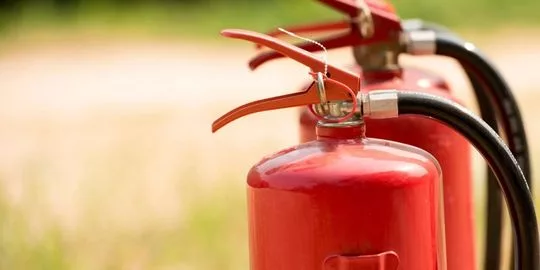
How To Choose Your Home Fire Extinguisher
Firstly, choosing the right type of fire extinguisher for your home is important. At OHEAP, it’s our job to inform you that you should also consider the maintenance and storage of your extinguisher.
The first step in choosing a home fire extinguisher is to determine why we need it. We have mentioned previously the amount of UK fires that occur each year. If you’re in need of more convincing then we have additional statistical information on home fires. Visit the UK government website.
We have the statistics and now we understand why we need the extinguisher. The second step is understanding what type of fire you’re expecting to occur. Typically, a UK fire will occur in the kitchen. We are aware that there are many different combustibles in a kitchen. For example, wooden cabinets, cooking oils, cloth blinds or tea towels, cleaning products etc.
The last step is understanding how to use the fire extinguisher. We have a simple acronym for you to remember exactly what to do… PASS.
- PULL the pin to break the seal.
- AIM the nozzle towards the base of the fire.
- SQUEEZE the handles together to discharge the extinguishing agent.
- SWEEP the nozzle from side to side.
As mentioned above, different fire extinguishers are capable of tackling different sources of combustion. For example, using a water extinguisher on electricals is extremely dangerous. Therefore, knowing how to use it properly varies from model to model. Most require that you pull out the pin before pressing down on the nozzle but you may need to check that this is the same with your model.
The Best Overall Home Fire Extinguisher
The main event! What is the best overall home fire extinguisher…
The ABC DRY POWDER! The best overall home fire extinguisher is the ABC Dry Powder. This is simply due to how versatile this fire extinguisher is. There are many pros to purchasing a dry powder fire extinguisher. The list of pros is as follows, they are that they are reliable, sturdy, effective, versatile and often recommended by firefighters.
If you’re looking for a multi-purpose fire extinguisher, this is a great option. We recommend dry powder extinguishers as they are great for fighting fires that involve a variety of combustibles. They can be used on Class A fires (wood, paper and cloth) as well as Class B (flammable liquids) and C (flammable gases). Additionally, these extinguishers can sometimes be used on electrical equipment.
The only con with an ABC powder home fire extinguisher is that it leaves a lot of messy powder afterwards, however, in the event of a fire, this shouldn’t be your primary concern.
Your Options of Home Fire Extinguisher
If you’re reading this, then you’re probably someone who wants to make their home a safer place. We applaud that, having fire extinguishers on hand isn’t just about protecting your house, it’s about saving lives too.
A fire extinguisher for your home is a must-have. A good fire extinguisher and general knowledge of fire safety can help prevent fires. Based on the information we give you, you can make an informed decision on which one would be most beneficial to you. If the dry powder fire extinguisher isn’t for you then we have more options which you can choose from. We recommend the following:
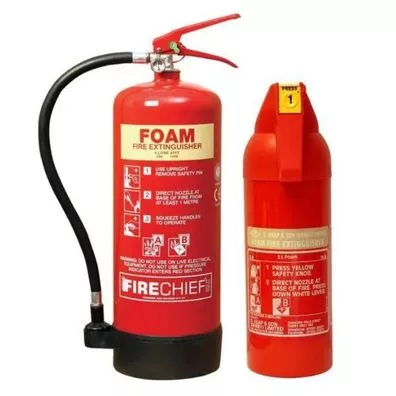
Foam Fire Extinguishers
Suitable for use on Class A solid combustible fires such as wood, paper and cloth. In addition, this fire extinguisher can be used on Class B combustible liquid fires such as gasoline, alcohol, oil-based paints and more.
A foam fire extinguisher is a very common type of fire extinguisher. Foam fire extinguishers work by releasing a foam that smothers the flame. Once smothered, the foam will prevent the flame from spreading or burning through other materials in its path causing asphyxiation.
Additionally, multi-foam fire extinguishers exist to be able to tackle Class F grease fires making them suitable for kitchens.
- Class A Combustible Solids: Cloth, wood, paper, rubber etc.
- Class B Combustible Liquids: Petrol, alcohol and paints.
- Class F Combustible Cooking Oils and Fats (Multi-Foam Option)
These fire extinguishers cover paper, wood, textiles, petrol, oils and diesel.
- Kitemarked to BS EN3
Powder Fire Extinguishers
Suitable for use on Class A, Class B, Class C and electrical fires. ABC dry chemical extinguishers are filled with ammonium sulphate and monoammonium phosphate. Unlike water, which is a conductor of electricity and can be hazardous when applied to an electrical fire, the dry powder will smother the flames without risking shocks.
The powder extinguisher is ideal for fires that start in wood, paper or cloth. However, dry powder cannot be used on Class F grease or cooking oil fires.
- Class A Combustible Solids: Cloth, wood, paper, rubber etc.
- Class B Combustible Liquids: Petrol, alcohol and paints.
- Class C Combustible Gases: Propane, butane and methane.
- Can be used on Electrical Equipment.
Powder extinguishers are our main recommendation for domestic use. This is due to them covering a wider variety of fires meaning it’s harder for user error.
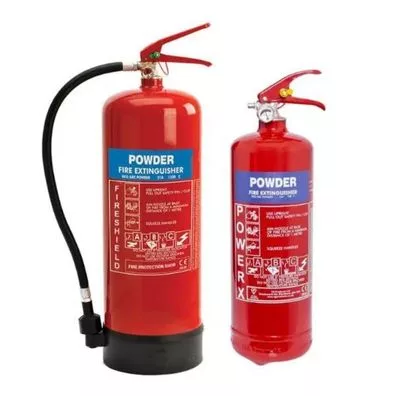
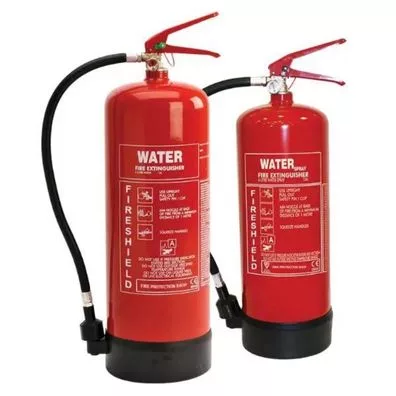
Water Fire Extinguishers
Suitable for Class A fires.
A fire extinguisher that uses water is a good choice if you’re fighting Class A fires, which are fires that involve things like wood, paper and fabric. Water fire extinguishers aren’t suitable for electrical fires as water is a conductor of electricity
These fire extinguishers are generally cheaper to purchase and refill. These fire extinguishers are not suitable for electric fires.
- Class A Combustible Solids: Cloth, wood, paper, rubber etc.
Carbon Dioxide Fire Extinguishers
Suitable for a Class B and electrical fire.
Carbon dioxide extinguishers, also called CO2 fire extinguishers, are the best way to put out electrical fires. That’s because carbon dioxide decreases oxygen levels, which deprives flames of their source of fuel and puts them out. Additionally, carbon dioxide fire extinguishers work quickly and leave no residue.
Again, cheaper than a typical extinguisher and covers flammable liquids and electrical fires. A good combination when bought with water fire extinguishers.
- Class B Combustible Liquids: Petrol, alcohol and paints.
- Can be used on Electrical Equipment
- Kitemarked to BS EN3
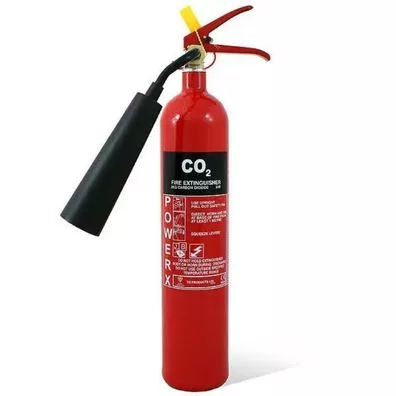
Kitchen Fire Extinguishers
The best kitchen fire extinguisher is one that you can easily access and use quickly. You want it to be small enough and capable of tackling the fire you expect to encounter in the kitchen. A commercial kitchen with fat fryers and hot oils would need a wet chemical extinguisher as this is a Class F type fire. Domestic kitchens are recommended to focus more on powder extinguishers due to their versatility.
The size of a fire extinguisher for your home depends on how much space is available for mounting and what kind of kitchen you have.
Kitchens need to have fire extinguishers that can put out fires involving combustible solids (such as paper and wood), flammable liquids (like small spills of cooking oil), and live electrical equipment. Some kitchens have gas cookers or hobs, adding flammable gases (Class C) to the list of fire risks. Unfortunately, most extinguishers do not cover all types of fires, so deciding which one is right for your kitchen can be tricky. However, there is now a firefighting device that can put out any kitchen fires, the water mist extinguisher.
Water mist fire extinguishers, which are filled with de-ionised water and deliver their contents in the form of an ultrafine coolant spray through a nozzle. They can be used to subdue solid combustibles, flammable liquids and gasses as well as small fat fires. They do not pose any danger when applied to live electrical equipment.
Wet chemical extinguishers are used only for industrial kitchen fires involving deep-fat fryers, and they tend to be expensive. However, a small 2-litre wet chemical model can be purchased for use in domestic kitchens where deep-fat fryers are common. Their smaller size makes them more affordable than larger models typically found in restaurants or factories.
Electrical Fire Extinguishers
Electrical fires are very dangerous as they are harder to tackle and they can spread rapidly around your home. In addition, electrical fires need to be fought with the right fire extinguisher, if you use the wrong one it can make the fire worse!
The best extinguishing agent for electrical fires is carbon dioxide, also known as a CO2 fire extinguisher. When you use a carbon dioxide extinguisher on an electrical fire, it will deplete the oxygen element from the fire which will cause asphyxiation and put out the fire. Additionally, carbon dioxide fire extinguishers are great because they work quickly and don’t leave behind any residue.
Conclusion
Hopefully, you’ve learned something about how to choose a fire extinguisher for your home. There are many different types of fire extinguishers, and they’re all designed to protect you from specific types of fires. When buying a fire extinguisher, make sure it’s rated for the type of fire that you need protection from. If you need help choosing the right one for your home, talk to an expert like ourselves.
We recommend having at least one multipurpose fire extinguisher and one small-scale type like the ABC or CO2 variety in each room of the house. We also recommend keeping a fire extinguisher in your car, as well as one on your boat. You never know when you might need them, and having them around can save you from a potential disaster!